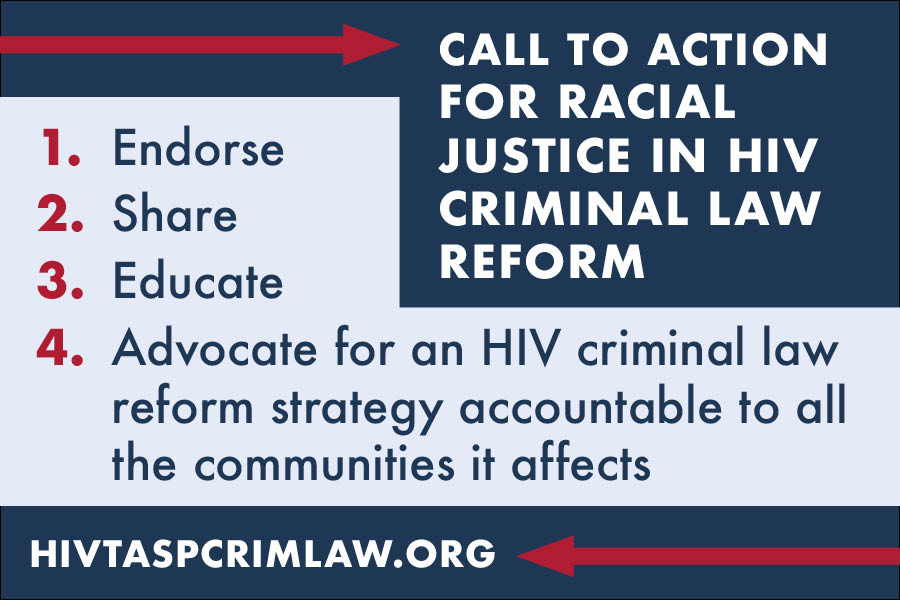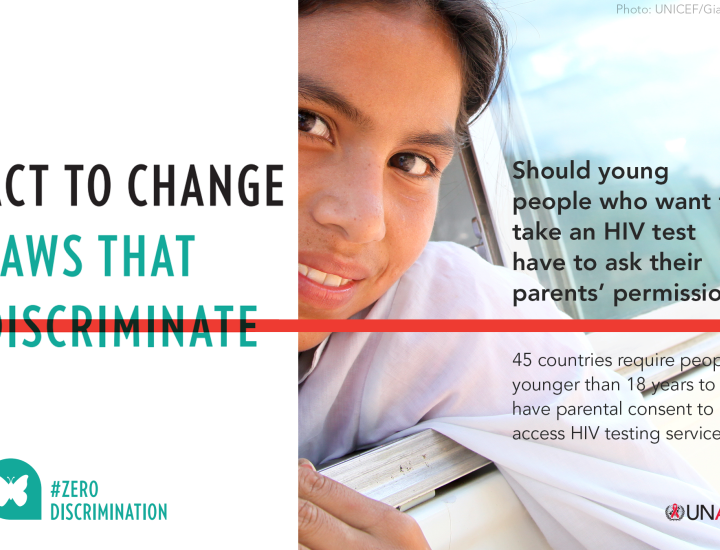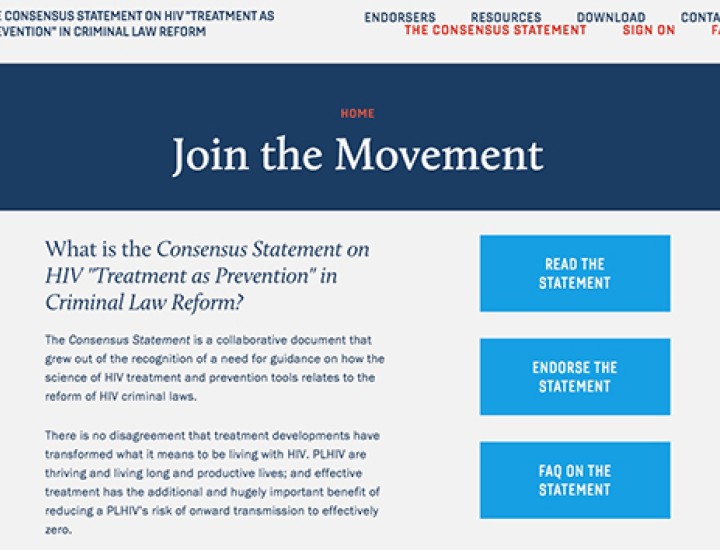News Release: HIV Criminal Law Reform: A Call to Action
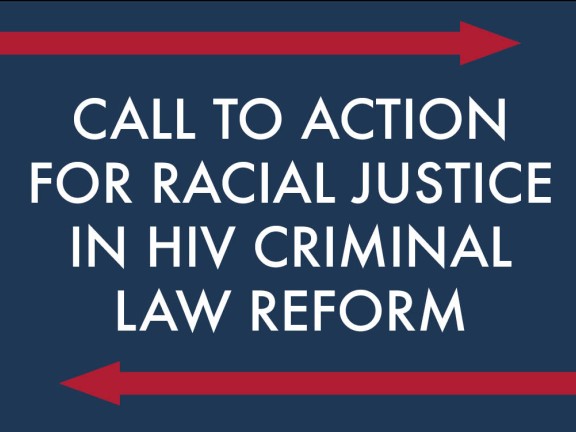
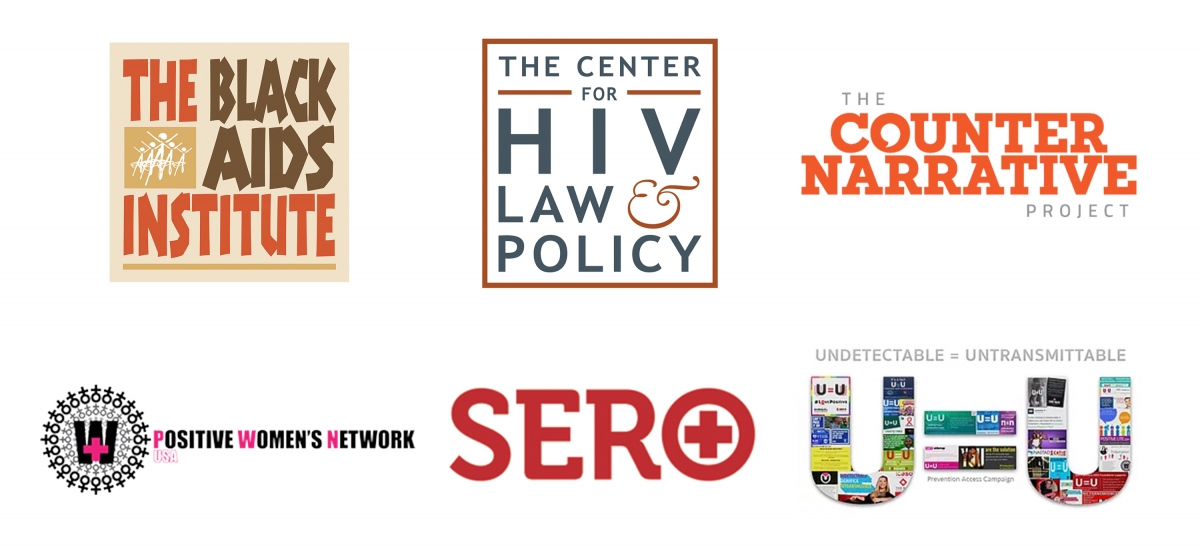
For Immediate Release
HIV Criminal Law Reform: A Call to Action
Racial Justice, Criminal Justice and HIV Organizations Call for an HIV Criminal Law Reform Movement Grounded in Principles of Racial Justice
New York, NY (August 22, 2018)—Marking the one-year anniversary of the launch of the Consensus Statement on HIV “Treatment as Prevention” in Criminal Law Reform, advocates affirmed their commitment to an HIV criminal law reform movement that is grounded in racial justice and leaves no one behind. The statement follows the recent conclusion of the 2018 International Conference on AIDS and its celebration of treatment advances that preserve health and render people living with HIV incapable of transmitting the virus.
In this Call to Action, while recognizing the power of the Undetectable=Untransmittable (“U=U”) message, advocates reiterate the dangers posed by reliance on U=U as a leading argument for HIV criminal law reform. The dangers are particularly immediate for Black people living with HIV (PLHIV) who are less likely to benefit from sustained viral suppression and more likely to be harmed by the criminal justice system due to deeply entrenched racial injustice.
Events over the last year have underscored the urgency of this question and advocates across the United States continue to grapple with the role of scientific advancement in HIV advocacy.
Earlier this summer, a small group of organizations focused on HIV, racial justice, and the law came together to draft a Call to Action that aims to mobilize organizations and advocates working on HIV criminal law reform. The Call to Action identifies various ways in which advocates and organizations can commit to reforms that advance racial justice.
The following are statements from the organizations that collaborated in the drafting, review, and release of the Call to Action.
“The law is intended to address intentional wrongdoing, not the success or failure of an individual’s access to health care. Reform efforts centered on an individual's viral load effectively create a largely Black and economically disadvantaged underclass of people who are considered more blameworthy than others due to health status alone.”
Arpita Appannagari, The Center for HIV Law and Policy
“We at the Black AIDS Institute believe to cut the stigma of people living with HIV and AIDS along with truly ending the outdated HIV Criminalization laws in many states across the country we must take actions that do not leave out parts of our communities—specifically Black communities—and must listen to those most impacted in order to truly liberate our people. When we use only U=U without taking in account other social determinants of health and the realities of living in this country and the barriers to care we are only reforming laws that still leave much of our communities to be further criminalized and attached to mass incarceration which has been used to reign terror on black communities.”
Maxx Boykin, Black AIDS Institute
“The U=U message has transformed the lives of people living with HIV around the world, helping to make the argument that HIV criminalization is outdated based on current science. However, we must be clear: that's not the only reason HIV criminalization is wrong and needs to end. Regardless of viral load, prosecuting and incarcerating people due to their positive HIV status is a gross violation of human rights. As with other forms of criminalization, the heaviest burden falls squarely on the most marginalized communities—Black people, brown people, people of trans experience—who are already the least likely to have access to care, thus compounding the injustices.”
Naina Khanna, Positive Women’s Network
“The U=U science is having a transformative effect on lives and the field. We’re also aware that in the context of criminal reform, there needs to be clear guidance for advocates on how it can be responsibly leveraged in ways that do not exacerbate harm, particularly for Black people living with HIV.”
Bruce Richman, Prevention Access Campaign
“We are currently living in times where we must not only champion and celebrate our tremendous scientific achievements that inch us closer to ‘getting to zero,’ we must diligently center the lives and experiences of the communities most impacted by HIV. All HIV criminal law reform efforts must be sure to consider the impact of that legislation on the Black community. Strategies to end the HIV epidemic begin with an emphasis on racial justice.”
Charles Stephens, The Counter Narrative Project
As the HIV criminal law reform movement continues to grow and more states mobilize for reform, we must hold ourselves accountable to our communities and to each other. That means standing firm for policy reforms that are fully grounded in racial, gender and economic justice.
###
To read the Call to Action, please visit the Center for HIV Law and Policy.org.
